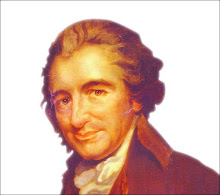"The course of his biography, with its episodes of buoyant enthusiasm and mute withdrawal, as well as eyewitness accounts of his alternately voluble and determinedly silent behavior, imply that Paine may have suffered from a form of bipolar disorder."
Nelson, Craig. Thomas Paine: Enlightenment, Revolution, and the Birth of Modern Nations. NY: Viking, 2006.
Comment:
Craig Nelson's proposition that Paine "may" have had bi-polar disorder
strikes me as the latest in a long history of strained interpretations starting with the accusation of his impotence by Tory hack-writer George Chalmers aka Francis Oldys and continuing to the present time with the turgid and imaginative screenplay -- admittedly interpretive art, not history -- of Trevor Griffiths. Why strain for an interpretation when, as Paine pointed out, the shortest distance between two points is a straight line?
Some degree of psychological analysis is doubtless appropriate where we have enough information to speculate. Psychohistory has played a part in professional history since the first historian assigned a motive to an historical player. But the behavior that Mr. Nelson identified as bi-polar, it seems to me, has a much simpler and more convincing explanation. Paine was elderly, extremely ill and suffering intense physical pain during the times when he was emotionally "down" or in "mute withdrawal" -- seriously ill and in pain. This has not been enough emphasized in the literature -- partly because Paine did continue to write and frequently quite well despite his illness. Naturally we can't know from this distance with certainty whether he had depressive illness or not, but in my opinion, bi-polar disease is not the straightest line between two points.
Paine never recovered from the illness that befell him during his incarceration. Described as an abcess in the side, he was delirious or unconscious for weeks at a time. In 1797, well after his 1794 release, he relapsed and nearly died while in the care of James Monroe and his wife. Still later, a credible visitor described his still abcessed side, exposed rib and perfect agony. Nerve disease, palsy, and stroke wore away the last ten years of his life until he passed away in 1809. Despite this travail, Paine completed many valuable, piquant and revelatory writings, in particular Agrarian Justice, Dissertation on First Principles of Government, and his eight Letters to the Citizens of the United States. If in some of his later work, the sounds at times impatient, abrupt, cranky or short, then we well know the source and perhaps admire his determination to be of earthly good unto the end of his life.
(originally posted to this blog Thursday, July 2, 2009)
© Kenneth W. Burchell 2009, All Rights Reserved.



